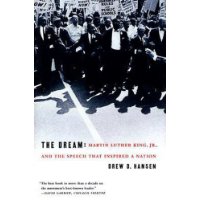| 商家名称 |
信用等级 |
购买信息 |
订购本书 |
|
|
 |
The Dream: Martin Luther King, Jr., and the Speech that Inspired a Nation |
 |
|
 |
The Dream: Martin Luther King, Jr., and the Speech that Inspired a Nation |
 |

基本信息·出版社:HarperCollins Canada / Ecco Press
·页码:293 页
·出版日期:2005年02月
·ISBN:0060084774
·条形码:9780060084776
·版本:2005-02-01
·装帧:平装
·开本:20开 Pages Per Sheet
·外文书名:马丁·路德·金传
内容简介 在线阅读本书
Book DescriptionOn August 28, 1963, Martin Luther King, Jr., electrified the nation when he delivered his "I Have a Dream" speech from the steps of the Lincoln Memorial. In The Dream, Drew D. Hansen explores the fascinating and little-known history of King's legendary address. The Dream insightfully considers how King's speech "has slowly remade the American imagination," and led us closer to King's visionary goal of a redeemed America.
From BooklistThis year marks the fortieth anniversary of the 1963 march on Washington and King's famous "I Have a Dream" speech, which thrust King into the national spotlight, provided a barometer of the national conscience, and reflected on both our past transgressions and future moral objectives. Hansen examines King's speech on numerous levels and in many contexts, revealing the confluence of forces that account for its unprecedented impact. He explores King's theological and intellectual focus and his roots in the tradition of black Baptist sermons. Hansen uses King's speech to examine the competing elements of an American society divided along North-South, black-white lines and to explore the contradictions of such interests along a moral continuum. King's speech provided a common code of moral respect, but not consensus of action, as diverse elements agreed to its greatness or purpose but not its call to act. Readers interested in the moral issues tied to the civil rights struggle will enjoy Hansen's analysis.
Vernon Ford
Book DimensionHeight (mm) 209 Width (mm) 140
媒体推荐 Customer ReviewsThe Power of God in Man, January 23, 2004
Reviewer: Patricia B. Ross (Wellesley, MA USA)
Martin Luther King was not an unusual black man; in fact, he wanted much of what many black men before him, probably all black men and women wanted. But Martin Luther King was a very unusual man, who happened to be black. His degree of passion, his conviction, his hope, and his perseverance were unlike most before him, and most after him, with the inspired, God given desire to make the world a better place for everyone, including blacks. His vision was not just the result of respect and reliance by his people, it was divinely inspired so that his passion, his hope emerged and blossomed before millions, many of whom were not familiar with him, his history, or his prominence and reputation. He was possessed of those rare qualities, and that rare talent, of the ability to inspire others to believe in themselves, and the world, that they had the dignity to alter their own dynamics, the manner in which they lived, and in the manner in which they were treated by others. As an evangelist, he was superb. For that, like Jesus, and many other prophets who have been threatening to the status quo, his ability to show others the way to self respect and to peace were certainly the force of why his life was taken so early, and so brutally. He was more than a leader; he was a messiah for the many black people who had waited so long for one to lead them out of the psychological bondage which was still very real to them. He positioned himself to show the way, and how to do it in the least offensive manner possible, by non-violence. He was a pillar of strength that even whites unfamiliar with him understood the necessity of yielding to God's will, instinctively knowing that all men were equal, and that all needed the recognition of being equal. Indeed, whites were aware of their obligation under the Constitution to recognize that equality but felt no compulsion to expect it of themselves until Martin forced them to face the truth they had so long avoided. Not only did he demand of blacks the energy and commitment to themselves, he demanded the energy and commitment of whites to respect themselves by being brave enough to help resolve the problem that had long festered in American social reality. The timing was right; the message was right, and Martin was right. He allowed none out of God's boat and helped everyone see that upon that ship, we were all afloat upon the ocean of humanity, and would indeed survive or perish. That message remains very much a part of his legacy, and today's reality although we face other issues as well, and the issues are now broader than ever. No one on earth has the option to say no to God and expect that it will be of no consequence to the world. He was the most remarkable of men that America has ever produced guided by his own devine light within as a beacon of humanity for all to follow.




